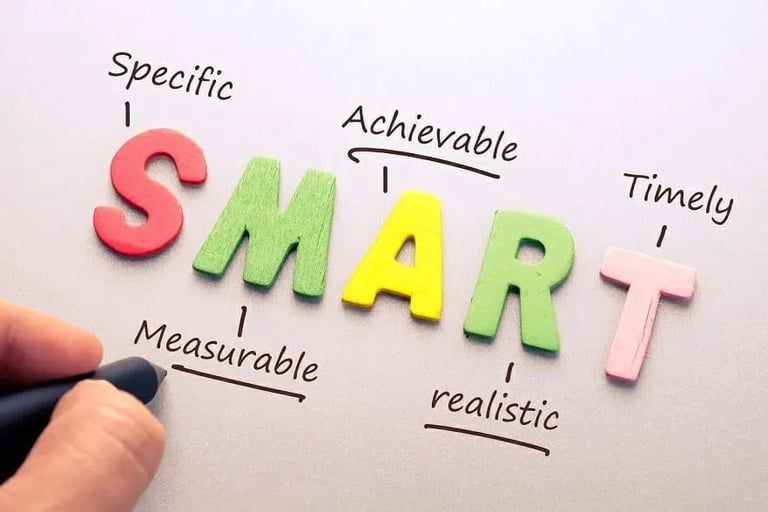Why most New Year's resolutions fail
There is a better way to set goals and build habits
CAREER & PRODUCTIVITY
12/12/20239 min read
Every year, people from cultures across the globe come together to celebrate the end of a year and welcome a new one. Inevitably, millions of people make some type of New Year’s resolution: a promise to themselves to make a positive change in their lives the next year. You might think that such a widely practiced tradition would be a helpful activity, but there’s an uncomfortable truth: they don’t work. A more recent study found as little as 8% of people achieve their resolutions.
You don’t even need the data to believe me on this issue. Quickly breaking New Year’s resolutions has become a meme. Before Covid, you could even track resolutions how quickly people gave up on their resolutions by visiting a gym in January, and then a few weeks later.
It’s easy to blame yourself for failing to meet your resolutions year after year, but it’s not entirely your fault; making a new years resolution is putting yourself at an instant disadvantage, for reasons I will lay out in a bit. Before we get to that, I want to set the groundwork with a simple framework for thinking about your own behaviors and changing them, which you can use to come up with your own personal strategy.
When you want to change behavior, there are 3 things you should think about:
Motivation: What drives you to take that action? What do you hope to accomplish? Your first step should be identifying the core motivation that drives what you want to do, or underlies what you want to stop doing. If you want to stop doing something, it’s not about deciding that you aren’t motivated anymore, but often finding some other way to make progress toward the same goal or finding a more important goal to pursue.
Action: What specific behaviors are you doing, or planning to do? It’s ok to start with general activities (example: exercise regularly) but you need to get very specific (example: attend 3 or more group exercise classes at the gym per week) in order to keep yourself accountable.
Discipline: What keeps your habits on track? What reminds you to do them, makes you want to do them, and prevents interruptions from breaking your streak? It’s important to build these systems for habits you want to establish, and systematically remove them for behaviors you want to get rid of.
Why New Year’s resolutions fail: weak motivation (and other psychological quirks)
Thinking about the three items above, all new year’s resolutions share a common characteristic that makes them very difficult to follow: the motivation.
Extrinsic motivation: You are using something extremely flimsy as the foundation of a life change: a calendar event. On New Year’s eve, you promise yourself you’ll do better next year because it’s a chance for a fresh start. This puts your motivation strictly in the “extrinsic” category, and it’s weak even by those standards. Changing your life requires continuous motivation, and a past calendar event simply doesn’t cut it as a driving force.
Psychological distance: Time and distance have a way of making things weaker, no matter if it’s in the past or future. Long distance relationships and long-term memories degrade without putting in extra effort to maintain them, and the perceived value of future rewards gets smaller the farther into the future you push them, an effect called “temporal discounting” by psychologists and economists. Most people would choose 100 dollars today over 120 dollars in 5 years, and a promise of being on Santa’s good list in December is not a bulletproof way to get children to behave months in advance, as any parent can tell you. Things that are far away hold very little power over your behavior in the moment, and the power of events in the past tend to fade over time. How much do you think about the fact that it’s a new year the second week of January? Chances are the excitement of the new year has already lost much of its flair within a few hours of the ball dropping.
How to discover your motivation:
The good news is, you likely have much stronger reasons for making a resolution than New Year’s. It’s important to be clear on what your personal motivations actually are for the change you want to make. Going back to the health-related resolution example, why do you want to lose weight? Ask yourself what really matters to you. Do you want to feel confident? Improve your health? These are different motivations that could drive the same behavior, but it’s important that whatever it is, it’s important to you. This is the intrinsic motivation that will keep you going when things get tough.
A helpful exercise is to take whatever motivation pops into your mind first, and ask “why?” Do this a handful of times, until it gets too hard or too abstract. Pretend you want to lose weight to avoid having to spend money on new clothes. Why do you want to save money on clothes? To buy different things? Why? What type of life are you trying to build for yourself with those things? So on and so forth. This activity has a name: It is called the “five whys” technique, and is actually a method for finding the root cause of a problem. Here, it can also be used to figure out your core motivations behind a specific goal.


A particularly strong type of motivation is what I like to call an “aspiration,” which is often structured in the form of “I want to become <X type of person>.” Compare the strength of “I want to be 20 pounds lighter” to “I want to be a healthy person,” or “I want to write daily” to “I want to be a writer.” When you think in terms of your identity, it’s much easier to motivate yourself to act in accordance with what you imagine that type of person is supposed to be doing. It’s also something that isn’t as vulnerable to change, or fading over time. You might also notice that it’s more difficult to say “I’ve done it, I finished!” This is another perk of having aspirations versus outcome-related “goals,” which allow you to tell yourself the job is complete. Having aspirations versus desired outcomes falls in line with what Simon Sinek might call “playing an infinite game,” where you are not going through life aiming to some arbitrary finish line, but enjoying the journey each step of the way.
Everyone is a little different, but you’ll know you found a good motivation when it feels like something that you could put on a poster or sticky note somewhere in a prominent space in your home or work area, and it will give you a nice boost when you need it. Keep in mind, though, that having motivation isn’t enough to change your behavior.


Don’t forget to make an action plan
Motivation is critical, but it’s not enough to change your day to day behavior if you have no idea what you’re going to do with it. You need a plan for what actions (tied to that motivation) you will take, and when. Remember the “why” exercise you did earlier? The parallel exercise to that activity is starting with your motivation or aspiration, and asking yourself “how” until you get to really specific details. Your new year’s resolution had a start date, but may not have had a specific schedule. There are a lot of slots that fit into “after Jan 1” which means you have a lot of room to wiggle out of your commitment.
When you start doing this activity, you may notice that there are a collection of actions that you might want or need to take at some point, maybe even a sequence of different actions. This is fine as long as each step is clear and you know where you’re going to start. The starting point is the most important one; don’t fall into the all-or-nothing trap: each change you make should be valuable on its own merits. Sure, doing everything on your list would be swell, but doing something is much better than doing nothing! Sequences can and will change as you make progress, so don’t feel trapped by a plan you drew up before taking any actions. A few tips for identifying the actions you want to take:
Make it specific: If someone else read your plan, would they know what to do?
Be realistic: Going from zero to a daily multi-hour routine is a recipe for fast burnout and quitting. Know your limits and challenge yourself appropriately
Put it into your schedule: not just “3x per week”, but which days and what time? I find having something on my calendar makes it far more likely that something will happen than if I leave it to myself to decide to keep up a habit in the moment.


How to be disciplined and build strong habits: set up systems
Not all actions are equally likely to “stick.” It is easy to go to the gym once. It is much harder to exercise times every week for years, through holidays and vacations and days you’re just not feeling it. Being disciplined is not a matter of willpower, but setting up systems that support your habits. Here are some tips to increase your likelihood of success:
Make your actions rewarding: Ideally you would enjoy your new lifestyle, but most likely changing your routine will be effortful and even painful at first. What can you do to make the activity fun while you’re doing it, and to feel a sense of achievement afterwards? Gamification is one way of doing it, but not the only way.
Pair your desired actions with something you already do: This is known as creating a cue, or a signal that it’s time to do the activity. If you do always do 10 pushups after brushing your teeth, it’s easier to remember to do them compared if you just planned to do pushups at some undefined point in the morning.
Create backup plans: Schedules shift. What will you do if something disrupts your plan for the week? It’s useful to build in a flexible bit of time into your week for things that mess up your plans, which is more often the rule than the exception.


A warning about “SMART Goals”
You may have heard of SMART: Specific, measurable, attainable, relevant, and time-bound. This idea actually came from an article about how to set management goals by G.T. Doran in 1981, and was co-opted by other fields and industries like education, medicine, and psychology. They appear to be effective for setting corporate goals, and some of these adjectives can actually good advice for individuals, when applied to actions.
SMART goals can fall short for people in their personal lives; an easy mistake to make is setting goals for yourself in the form of results you want to achieve, like “lose X pounds in 3 months” or “make X amount of money in 2 years.” There are several reasons I would not recommend these types of goals outside of a business setting:
It’s not in your control: When you promise to achieve something out of your control, you make the assumption that the behaviors you set out to do are going to get you there. Even if you do really well at those activities, you may fail to reach your goal. Like promising to win a competition, for example. You can train diligently and intensely, more than your competitors, and still fail to meet that goal.
It might not be meaningful: Defining good metrics can be harder than you think. If you end up using an outcome or a metric that doesn’t accurately reflect on your progress, you end up tricking yourself. Imagine being a bodybuilder who decides to use BMI as a measurement for good physique, or a world leader that uses GDP as an indicator for how the average citizen is doing. If you lift weights, BMI will often put you into the “overweight” category even if you’re in good shape (BMI doesn’t consider muscle tone), and the GDP of any nation with income inequality will give you an overly optimistic judgment about the financial well-being of the people (GDP tells you a country’s productivity overall, not the wealth of its average citizens).
Outcomes are finite and temporary: You probably want permanent changes. Even if you set a perfectly balanced goal for where you are, If you fail to continue setting appropriate goals once you meet the previous one, it can be hard to keep yourself driven to maintain your habit. What do you do when there’s no clear next mountain to climb? Success is not finishing the journey because your habit doesn’t necessarily have a desired endpoint.
Contrast this with finding your core motivations (which don’t usually have an endpoint) and linking them with habits you can develop that are intended to keep going. You can succeed at keeping your habit going this month, but that doesn’t mean you are done. There’s always next month, and you will find areas you want to improve or scale up once you reach a certain level.
To sum it up
Make sure you know your core motivation for making the change you want. This is your intrinsic motivation that won’t disappear next year
Commit to a specific, scheduled plan of action; don’t set goals based on outcomes you can’t control
Make it easy and rewarding to do your actions, and give yourself the flexibility to deviate from your plan and still keep your habit
